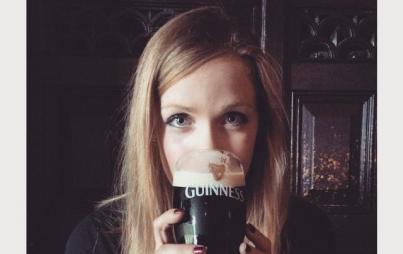
Alaina Leary
I'm among a subset of the asexual community who experience rare sexual attraction exclusively to people I have forged deep, intimate emotional bonds with.
I didn't use the word "asexual" until I was a senior in college. I didn't so much use the word as I slurred it, in between a long drunken ramble, to my girlfriend and our best friend in our apartment's small kitchen.
A few hours earlier, at the party we were hosting in our apartment, a friend had shared intimate details of her sex drive — more like sex overdrive. Later in the night, a friend asked if it was weird that she didn't feel the urge to have sex very often. And there I was, spewing my guts in an alcohol-fueled rage against poor sex education and poor media representation to two of the people I'm closest to.
To this day, they're the only people who have ever heard me use the label "asexual." I'm among a rare collection of people: at 22, I've been with the same romantic and sexual partner for seven years now. I talk about my sex life openly to the point where my friends were unsurprised when I wrote a Cosmopolitan piece about role-playing in bed. How, then, can I be asexual?
Asexuality, for me, has always been a spectrum. There's no doubt in my mind that, from puberty onward, I've had less desire to have sex than most of my close friends, and that I'm attracted to significantly fewer people. I've only had one sex partner and haven't been put in the position of looking for another, but if I did, it would be pretty damn impossible for me to find one.
I'm among a subset of the asexual community who experience rare sexual attraction exclusively to people I have forged deep, intimate emotional bonds with. That doesn't sound bad — and for the most part, it isn't. If I were single, it would prevent me from considering one-night stands without thinking about the consequences. Unless, of course, the one-night-stand was with one of my closest friends after a long, passionate discussion — in which case, consequences be damned.
The only reason I even realized I was capable of sexual attraction was that, in eighth grade, I fell for one of my best friends. She and I would have lengthy sleepovers where we did everything but sleep — we talked late into the night about our futures, our fears, our lives, and then we cuddled through Final Destination 3 and burst into laughter at South Park. It was the first time a crush had ever escalated beyond just thinking the person had a nice personality. I knew every inch of her mind, so I finally felt something I'd never felt before: I wanted to have sex with her.
By the end of high school, I could count on one hand the number of people I'd found myself sexually attracted to. In fact, one of the reasons my initial feelings for my girlfriend were so impossible to ignore was because our emotional connection was the strongest I'd ever had — so strong, in fact, that I'd even dream about passionate make out sessions while she was sleeping over my house. Sometimes, the make outs even led to more.
As we navigated the early stages of our relationship, I learned what I'd always known to be true: my perception of sexuality and sexual attraction was different than other peoples'. Even in a long-term relationship, it was difficult for me to see her and jump right into a sexy situation, even though the emotional connection always existed as a foundation. It was as if my brain needed to be reminded. The best foreplay, for me, was sitting out by the docks on the water, discussing fantasy book series at length and laughing at inside jokes. It wasn't that I didn't find her aesthetically pleasing —it was the fact that I've always been incapable of finding anyone, even a celebrity, sexually attractive without the emotional bond.
I can't even muster sexual attraction to celebrities unless they are playing a character I find myself very deeply connected with, like Emma Watson as Hermione Granger. I can look at an aesthetically pleasing celebrity and comprehend their sexiness, but I don't actually feel it. For this reason, fictional characters in books are an ideal solution: not because I can imagine their appearance any way I want, but because it seems as if I know them on a deep, personal level after spending hundreds of pages in their worlds.
Being asexual is like spending time in a room with a group of friends who just came back from an intimate trip together that you weren't able to attend. You can hear them describe every painstaking detail, but you can't create those memories. Your imagination can grasp the blurry edges of what their lived experience is like, but you won't feel nostalgic when you look back on the trip six months later. I understand why people put Leonardo DiCaprio on their celebrity fuck lists, but I just can't. Maybe someday, if he plays a somewhat shy, sarcastic journalist in a movie series who I can really connect with. I'll keep my fingers crossed for that day to come.







